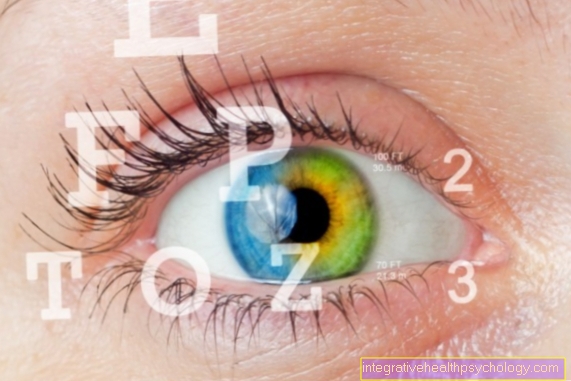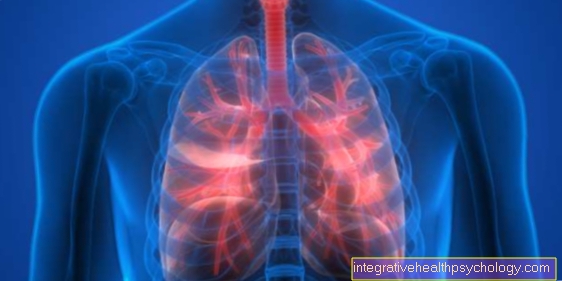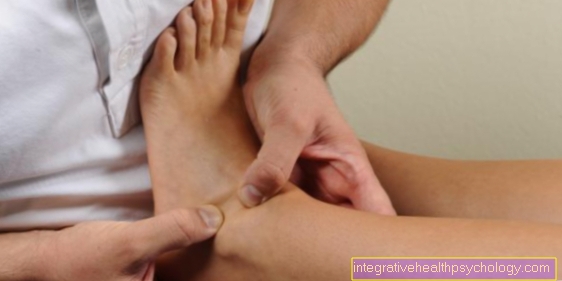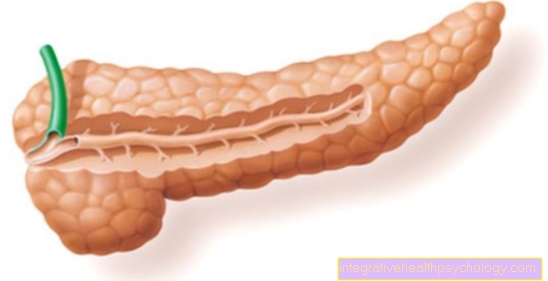Pinched nerve on the hip
introduction
External pressure, excessive strain or poor posture can lead to a pinched nerve on the hip, which manifests itself in various complaints, especially in the area of the respective thigh. Most of the time the nerve is not really pinched, it is simply irritated. The doctor can often make the diagnosis based on the symptoms described.
If the cause of the pinched nerve is identified and corrected, there is usually complete healing. However, this can take several weeks and there is a risk that a nerve will be trapped in the hip again. However, depending on the trigger, this can be prevented to a certain extent.

The reasons
The possible causes of an entrapment of a nerve on the hip vary and in many cases ultimately remain unclear. Often there is not just one trigger, but rather an interplay of various factors that lead to the development of the complaints.
Obesity, for example, is a significant risk factor. The exposure to high body weight promotes the development of an entrapment of a nerve. A lack of exercise and weak core muscles, such as those found in people who sit a lot, also increase the risk of pinching a nerve in the hip.
Another risk factor favored by the above is hip arthrosis. Nerve irritation can be triggered by the bony attachments that sometimes arise on the joint. However, young, active and healthy people can also contract a pinched nerve on their hip. On the one hand, excessive stress, for example through strength training, can lead to entrapment. On the other hand, trousers that are too tight and a belt that is too small can exert pressure from the outside in the area of the hip joint and cause the typical symptoms.
Some doctors are also of the opinion that inheritance in some people has an increased risk of contracting a pinched nerve. However, this is difficult to prove and can therefore not be regarded as an independent cause.
Find out more about the topic here: Nerve damage.
Symptoms of a pinched nerve
When a nerve is pinched or irritated, symptoms arise from impairment of its function. In the case of nerve tracts, a basic distinction is made between those that run from the brain to the muscles and convey commands such as moving the leg and those that pull from the individual areas of the body to the brain and convey information such as pain or touch.
Depending on what kind of nerve or which parts of a nerve are disturbed by an entrapment, different symptoms can occur.
With a pinched nerve on the hip, the transmission of information from the respective leg to the brain is generally only impaired. For example, abnormal sensations such as tingling, numbness or "pins and needles" occur on the thigh. In addition, a pinched nerve on the hip can also be very painful. Typically, the character of the symptom pain is described as burning when a nerve is irritated. A possible entrapment of a nerve on the hip can also be recognized by the fact that the complaints are dependent on a movement in the hip joint and, depending on the position of the leg, become stronger or weaker or, for example, only appear under stress such as when walking.
More information on the topic Nerve pain you'll find here.
Symptoms in the thigh
A pinched nerve on the hip typically manifests itself as symptoms in the thigh. On the one hand burning pain and on the other hand abnormal sensations such as numbness or tingling can occur. Since each nerve is responsible for the perception of information such as pain or touch for a limited area of the body, the symptoms are typically also limited to that area.
The nerve that is most commonly affected by an entrapment in the hip, therefore, the symptoms occur on the outside of the thigh. In addition, the symptoms in the thigh are usually triggered primarily when walking. However, lying flat with the hips extended can also increase the symptoms. Flexing the hip, on the other hand, often leads to a decrease in symptoms in the thigh.
Also read the article: Meralgia paraesthetica.
The diagnosis
The diagnosis of a pinched nerve on the hip is usually made by the family doctor or orthopedic surgeon on the basis of the patient's complaints and a targeted examination of the hip joint and possibly the back. The doctor will ask what symptoms are present, how long they have existed, in which area they occur, whether there was a trigger and what intensifies or alleviates them. Usually the typical description of the symptoms is sufficient to make the diagnosis.
The main purpose of the physical examination is to exclude any evidence of another cause of the symptoms, for which further diagnostics and the initiation of a specific therapy could be indicated, such as hip osteoarthritis (wear disease of the hip joint). If the results of the conversation and the examination suggest an entrapment of a nerve on the hip as the cause of the discomfort, further diagnostics such as a blood sample or imaging using X-rays or MRI does not make sense, as this would not have any consequences for the patient.
The treatment
When treating a pinched nerve on the hip, the first question to be clarified is whether a cause can be identified that led to the emergence of the symptoms.
If the patient has overstrained the hip joint during strength training, for example, a break in training is the primary therapeutic measure. If the trigger was a belt that was worn too tightly or trousers that were too tight, a change to additional clothing would be the main treatment procedure.
However, if the cause is not so clear, various measures can be taken to relieve the discomfort and help the nerve recover. Initially, excessive stress should be avoided, but bed rest should not be observed. Short regular walks are useful. If the pain is so severe that movement is hardly possible, a light pain medication can be taken for a few days. If you suffer from discomfort due to the pinched nerve, especially at night, you can try to put a pillow under it so that a complete hip extension is avoided. Usually the symptoms subside within a few days. Otherwise the doctor should be consulted.
In addition to acute therapy, a possible recurrence of the symptoms should also be counteracted at an early stage. Obese people are strongly advised to reduce their body weight, as this is the best way to prevent the recurrence of nerve entrapment on the hip. In addition, it is fundamentally important, especially for people with a sedentary job, to be physically active on a regular basis in order to prevent nerve entrapment or other musculoskeletal complaints as well as possible. Swimming, cycling or Nordic walking, among others, are suitable.
This article might also interest you: Lose weight by changing your diet.
The duration
No general statement can be made about the duration of the complaints that arise when a nerve is pinched in the hip. If there is a clear trigger such as a belt that is worn too tightly or the pressure of the seat belt during a long drive, the symptoms usually subside within a few hours after the cause has been rectified.
Often, however, the origin of the symptoms is less clear or there are various factors that have led to the nerve being pinched in the hip. In such cases, the nerve irritation and the resulting complaints can last for several weeks. It is important to take measures at an early stage to resolve the symptoms.
If there is no improvement or the symptoms get worse, a consultation with the doctor is indicated after a week at the latest.If the symptoms of a pinched nerve are ignored or only suppressed by taking painkillers, permanent nerve damage can be threatened.
What is meralgia paresthetica?
Meralgia paraesthetica is the medical term for an irritation of a special nerve in the hip region, which occurs relatively frequently and usually leads to typical complaints. This affects the Lateral femoral cutaneous nervewhich translates as “cutaneous nerve of the outer thigh”.
This nerve runs from the lumbar spine in the area of the pelvis to the thigh. It is only slightly protected by the surrounding tissue at several narrow points, which favors possible entrapment. In addition to external mechanical pressure, obesity and excessive stress on the hip joint can cause the typical symptoms. Meralgia paraesthetica is sometimes referred to as inguinal tunnel syndrome.
Read more on the subject here Meralgia paresthetica.
What alternative diseases can it be?
Often times, if a nerve is trapped in the hip, it is not very clear, so that there may be some alternative diseases behind it. Since some of these require further diagnostics and a different treatment, it is important to distinguish them through the medical consultation and the targeted physical examination.
A possible alternative disease is wear and tear of the hip joint (so-called. arthrosis). Older people are usually affected by this, and movement-dependent pain occurs in the hip joint area. Tingling and numbness like with pinched nerves are less typical, but do not rule out osteoarthritis.
It must also always be borne in mind that several complaints can be present at the same time, which can possibly influence one another.
Another alternative disease that may be behind the symptoms is a herniated disc in the lumbar spine. As with the pinched nerve on the hip, this can lead to discomfort and numbness in the thigh. However, the area in which the symptoms occur is often different. A herniated disc can also impair muscle strength.
A differentiation of the clinical pictures is usually possible through an examination by the doctor even without the use of imaging procedures.
The symptoms of a herniated disc - Find out more about this here.





























